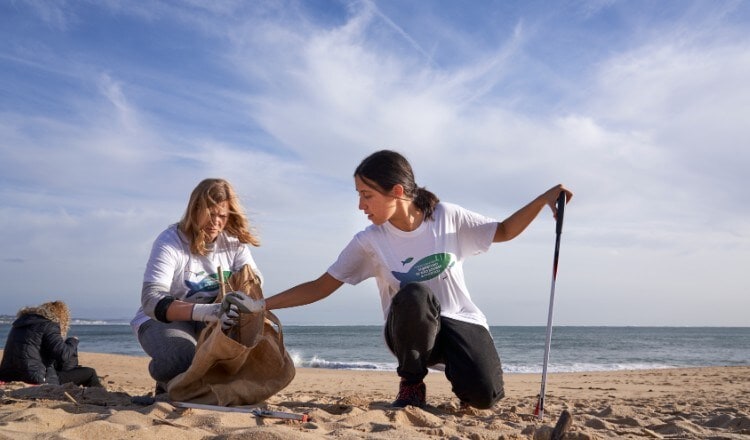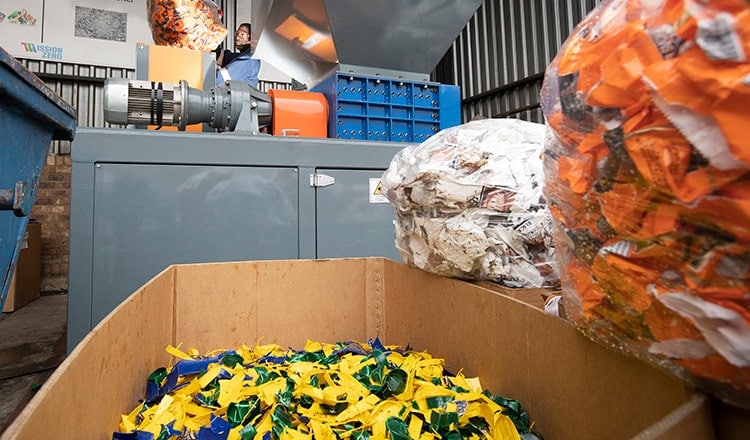| INTEGRATED REPORT 2019 |
Around the world each year over 350 million tons of plastic waste are generated. Improperly disposed plastics can spoil landscapes and impact wildlife. About one million tons of cigarette filters are produced annually across the tobacco industry. While made of cellulose acetate (CA), a wood-sourced bioplastic that biodegrades slowly, they are among the most frequently found litter items. We aim to reduce littering at its source by encouraging and enabling smokers to dispose properly of their cigarette butts.
Why it is important to us and our stakeholders
A cigarette butt consists mostly of CA, fine paper, and small amounts of tobacco, ash, and smoke residues. The fine paper and tobacco residues degrade rapidly; the cigarette filter, which is made of CA, takes longer to degrade. The overall degradability of cigarette butts depends on the surrounding biophysical conditions, with degradation times ranging from three months to 15 years. Beyond environmental considerations, cigarette butt litter and litter in general have a social impact, from the cleanup costs to perceptions of untidiness and lack of safety in areas where litter is prevalent. There is also a risk, yet to be quantified, of ingestion by wild animals.
As a global manufacturer producing 766 billion cigarettes and heated tobacco units per year, sold across more than 180 markets, PMI is in a position to play an important role with its consumers in littering prevention. Plastic waste from consumables, devices, and packaging sold by PMI amounted in 2019 to 165,000 tons of plastic. The largest share (86 percent) is composed of the bioplastics used in the filters of conventional cigarettes and IQOS heated tobacco units.
While many consumers dispose of their waste properly, too much waste ends up in the environment. We are addressing this littering issue with a multi-pronged approach, including awareness-raising campaigns, ongoing research into alternatives to CA filters, and improved design of products and packaging. Such efforts also have the potential to help mitigate costs related to emerging environmental legislation. Moreover, given the highly visible nature of butt littering, addressing the issue carries reputational benefits for our brands and company.
Achieving our aims
Littering is clearly linked to consumer awareness and attitudes, as well as to the availability of an adequate waste-disposal infrastructure. To curb butt littering, PMI emphasizes changing consumer habits. Many consumers do not perceive cigarette butts as having a significant environmental impact, due to the items’ small size and to misconceptions about their composition and degradability. Our efforts focus on raising consumer awareness and promoting the availability of proper disposal infrastructures. We then seek to contribute to effective public policy development by sharing insights into the environmental, social, and economic aspects of anti-littering approaches.
Our aim:
-50%
Reduction of plastic litter from our products by 2025 (versus 2021)
We have an anti-littering policy in place and are acting across PMI to deliver on it. To ensure activities are implemented globally and will have a tangible impact, we have developed an anti-littering toolbox that our affiliates use to develop local, context based strategies. By the end of 2019, 64 countries were using the toolbox to develop their plans, with 31 of them ready to start or already having started implementation. We develop, monitor, and assess both global and local programs. We are committed to working in partnership with all relevant stakeholders in our markets to develop and share the most innovative approaches.
On June 5, 2019, the EU Council and the EU Parliament adopted Directive (EU) 2019/904 (Single Use Plastics Directive) on the reduction of the impact of certain plastic products on the environment. This will require tobacco manufacturers and importers to participate in the extended producer responsibility (EPR) costs of the collection of cigarette butts from public collection systems and the cleanup of butts littered on public grounds. To take effect, the directive will have to be transposed by the European member states by July 2021. We support the concept of EPR, provided that the schemes put in place are ecologically and economically efficient and socially acceptable and deliver on the goal of reducing littering.
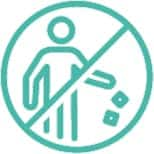
We have an anti-littering policy in place and are acting across PMI to deliver on it
Research for filters with higher degradability
For many years, PMI has been actively evaluating alternative cigarette filter materials with a lower environmental impact than cellulose acetate (CA), an already renewable and partially biodegradable material. To be acceptable, any new material has to satisfy four criteria:
good filtration efficiency and consistency, similar to CA filters;
significant reduction in total carbon footprint and/or significant improvement in marine, aquatic, and soil biodegradation versus a CA filter;
acceptable taste characteristics, as a product must be successful in the market to have the desired positive impact on the environment; and
commercially viable at scale (all materials science developments start in the laboratory and need to be conducive to industrialization at large scale and at competitive costs).
Based on extensive chemical testing, machinability trials, biodegradation evaluations, and consumer-testing conducted using prototypes, past projects have met one or more of the above criteria, but no better alternative to CA has yet been found. We will continue to explore options as new materials and processes become available.
Plastic footprint of PMI products
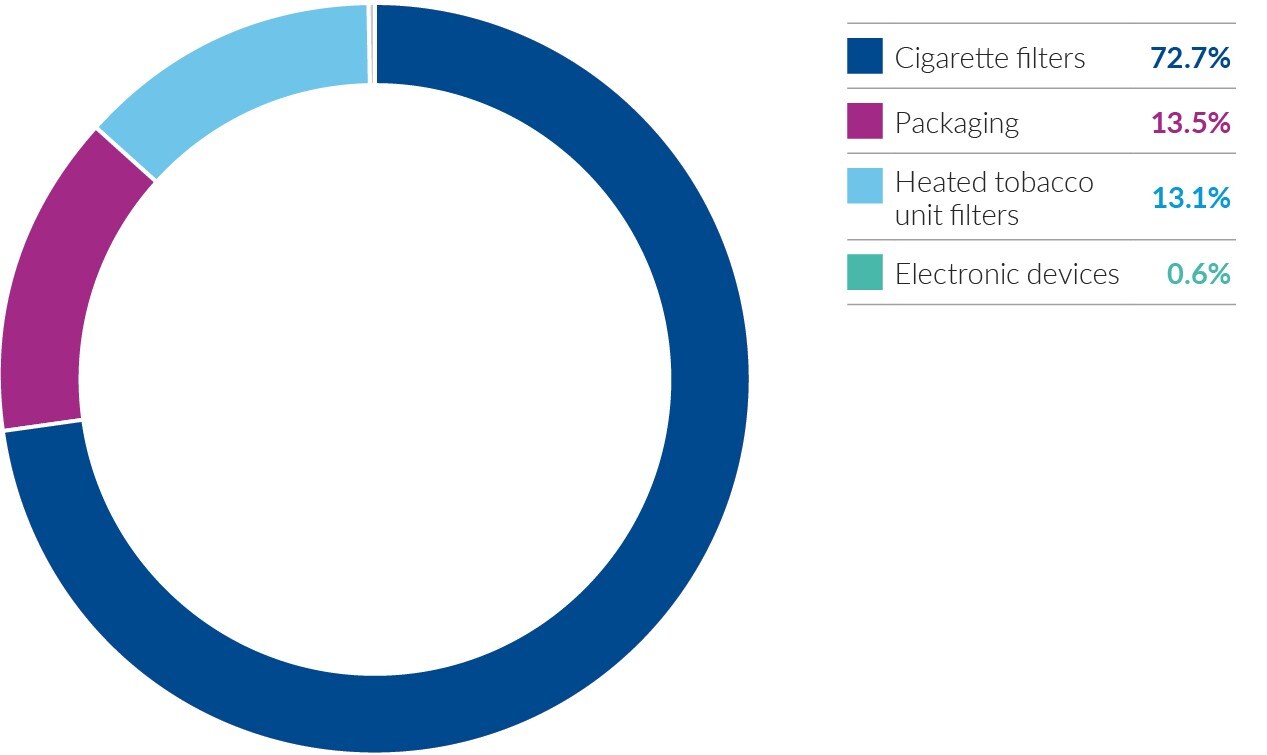
Progress in 2019
Throughout 2019, we expanded our programs, implemented cleanup projects in 31 countries, and formalized our anti-littering policy.
Raising awareness
Anti-littering campaigns
Education is the starting point in our promotion of anti-littering. We aim to create impact by developing campaigns that raise awareness, appeal to individuals’ consciences, and show them how to properly dispose of cigarette butts and other litter. An essential starting point to any campaign is to identify the littering hot spots perceived as focal areas by local authorities, anti-littering organizations, and citizens. These might include areas such as particular streets, squares, parks, beaches, and outdoor event spaces. We also collaborate with industry peers and partner with anti-littering organizations and public authorities. Smoking habits, environmental awareness, and disposal practices vary by country, and combating cigarette butt littering requires a locally customized approach.
Anti-littering programs led by PMI at the country level have grown: By the end of 2019, we had 54 anti-littering initiatives mobilizing our employees globally.
In September 2019, PMI joined the annual World Cleanup Day, the world’s largest litter cleanup event. Over 3,900 PMI employees and other volunteers in 51 cities across 31 countries participated in cleanups. Highlights included:
Mexico – 140 colleagues in seven cities filled a hundred bags with waste;
Senegal – Our team helped to clean up the beach in Ngo, the westernmost point of the African mainland;
Poland – We launched a digital competition through which 500 employees conducted individual cleanups.;
Indonesia – More than 260 participants between Jakarta and Surabaya gathered a total of 12,500 kilograms of waste and 25,000 cigarette butts; and
- Philippines – We mobilized community partners, recruiting more than 1,000 cleanup participants in four cities over two days.
Overall, our teams picked up 83 tons of waste and more than 827,000 cigarette butts (representing almost 170 kilograms).
While these cleanup efforts will not resolve the problem of littering, we believe they are a good way to raise awareness among the general public and show our commitment to tackling the issue of cigarette butt littering.
Technology also can play a role in raising awareness and encouraging behavior change. During World Cleanup Day, PMI trialed the technology of antilittering organization Litterati, which empowers people to run neighborhood cleanups. Litterati’s app enables users to collectively map litter hot spots by photographing and tagging items of litter.
Leveraging our largest brand
Where this is allowed, cigarette packs can be a means to communicate anti-littering messages to adult smokers and inspire collective action. In 2019, we developed a limited-edition pack for our flagship Marlboro brand. By the end of 2019, the special pack was on sale in nine markets across the EU, with an estimated reach of 2.9 million legal age smokers and 190,000 retail outlets. The plan is to significantly scale it up by the end of 2020 to amplify our message on litter reduction among a wider audience. We will share the outcomes in future reporting.
Exploring the potential of disposal solutions
We are clear that education must be accompanied by convenient cigarette butt disposal solutions. PMI continuously seeks expert input to develop and share innovative approaches to alternative waste receptacles and other portable solutions. In Italy, for example, our #cambiogesto multichannel campaign in Palermo paired awareness-raising with the distribution of a portable ashtray device. It is estimated that the new awareness and practical support resulted in 120,000 fewer littered cigarette butts in Palermo’s campaign beach sites during the month of August.
Where smokers are on the move, portable ashtrays can help reduce littering. Currently, however, the adoption rates of portable ashtrays among smokers are very low, typically under 1 percent. Adoption rates are higher in countries such as Japan, where local culture and legal enforcement drive their use. The limited uptake in other markets is due to inconvenience: It is an extra item to carry, it requires cleaning, extinguishing the cigarette is a more involved process, and there is some risk of mess and odor. We believe that improved design and availability will lead more consumers to accept and use the devices.
In the U.K., PMI has partnered with Clean Up Britain, a leading anti-litter behavioral change organization, to research littering behavior and portable ashtrays. The findings indicate that attitudes to littering depend on ashtray design, but also on respondent demographics, social situations, and perceived risk of fines. The factors affecting acceptance include ease of use (easy stubbing, opening, closing, cleaning), safety (perceived risk of melting and plastic), effectiveness of seal (to prevent smell or risk of spill of ashes), portability (size, shape, and presence of clip to carry), quality (reliability and durability), and design (look, customization, and sustainability). The findings will be used to develop portable solutions that are more likely to be adopted by smokers on the move.
Social norms and enforcement
Enforcement can refer to penalties and fines, but it can also be more broadly interpreted to include social control and appealing to the values of citizens. To curb littering, consumers should be reminded of existing regulations and shown that littering is socially unacceptable. The #cambiogesto campaign in Italy appealed to the conscience of smokers (“Part of you already knows what to do”) to shift their habits from flicking on the ground to disposing in an ashtray.
We are clear that education must be accompanied by convenient cigarette butt disposal solutions.
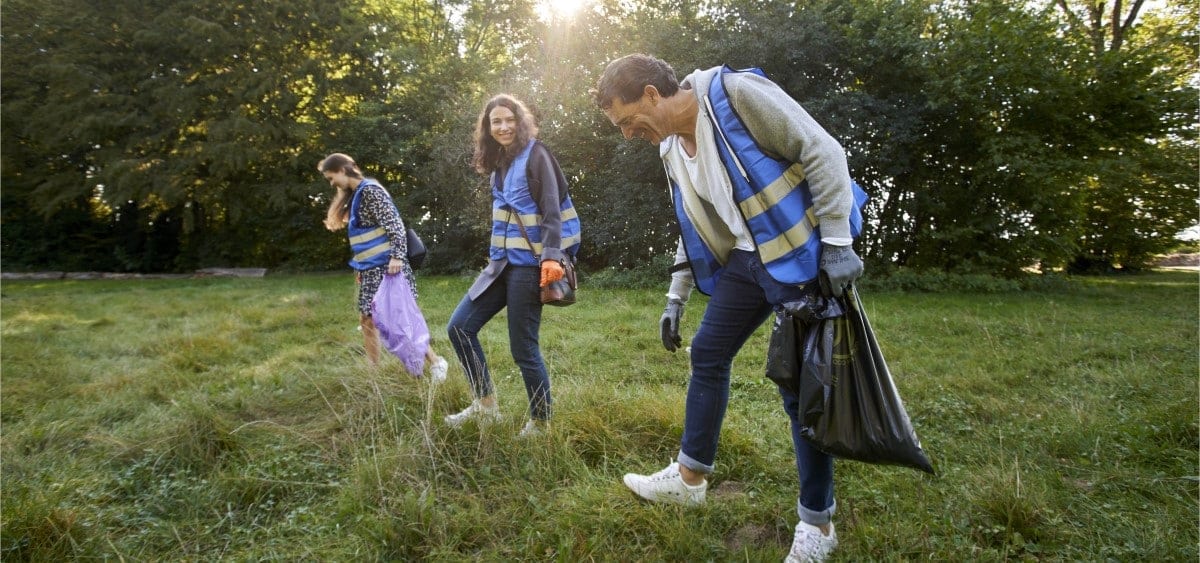
Anti-littering awareness campaign in Austria: piloting a multipronged approach to drive social change
PM Austria piloted a multipronged, unbranded, anti-littering campaign in the city of Vienna. This campaign aimed to (i) increase both awareness and declared non-littering behavior among adult smokers, and (ii) reduce the incidence of both cigarette butt litter and general litter in selected hot spots. As part of the campaign, awareness messages were placed in 301 points of sale and at public transport stops. To trigger curiosity and connect with adult consumers, the team used local expressions, humor, and nudging elements in campaign visuals, design, and execution.
The on-the-ground campaign encouraged citizens to visit a website to learn more about reducing littering. This website presented factual information about cigarette butts (e.g., how long a cigarette butt takes to decompose), inspiring stories about fighting the issue, and a call to action for visitors to join an anti-litter challenge, aiming to collect pieces of litter in Vienna. This challenge was hosted on the Litterati app, which enabled users to photograph and tag individual items of litter and created a virtual community that jointly collected over 26,000 pieces of litter. Vienna’s 7th district was a special focus for this campaign, with an intensified set of activities in bars, clubs, and restaurants, as well as bus and tram stops, for instance. The team also ran different experiments to better understand what drives change in consumer behavior, using pocket ashtrays (available at points of sale, legal age meeting points, and events) and nudging techniques in fixed ashtrays (installed in private companies).
The impact of this campaign was carefully assessed and included actual physical measurements by Litterati of cigarette butt litter incidence before, during, and after the campaign. While the campaign did not seem to measurably affect cigarette butt litter awareness nor declared non-littering behavior among consumers, the street measurements showed it did have a positive effect in reducing cigarette butt litter incidence in the city of Vienna (-8 percent), and this reduction was more pronounced (-15 percent) in the hot spots of the 7th district that were the target of the campaign’s intensified set of activities. The insights from this pilot will help us shape our future initiatives.
We will ramp up anti-littering campaigns across the markets where we operate.
Next steps
We will ramp up anti-littering campaigns across the markets where we operate, in cooperation with key stakeholders, in order to meet our target to halve the plastic litter from our products by 2025. We had planned to define the baseline in 2020, but due to the COVID-19 confinement, this year will not be representative, so we will define the baseline in 2021. We will develop an online platform to share information, testimonials, messages, and tools to encourage as many people as possible to combat littering. Our approach to materials, packaging, waste management, and electronic product stewardship increasingly aligns with the concept of the “circular economy” and is discussed on the next page.
This online supplement to our integrated report should be read in conjunction with PMI’s Integrated Report 2019. The information and data presented in this online supplement cover the 2019 calendar year or reflect status at December 31, 2019, worldwide, unless otherwise indicated. Where not specified, data come from PMI estimates. See About this online supplement for more information. Aspirational targets and goals do not constitute financial projections, and achievement of future results is subject to risks, uncertainties and inaccurate assumptions, as outlined in our forward-looking and cautionary statements.


